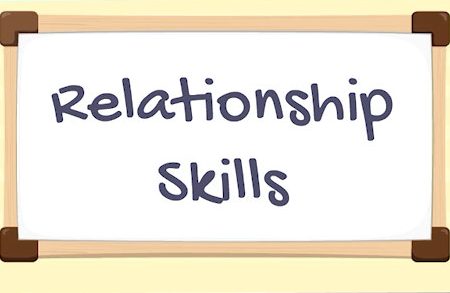
Prompts That Support Relationship Skills
Social-Skills is any skill facilitating interaction and communication with others. Ability to tolerate differences and rejections in interpersonal situations.
- Effective Communication: Assessing one’s ability to listen actively, express oneself clearly and assertively, and engage in open and honest communication.
- Conflict Resolution: Evaluating how well an individual can identify and address conflicts in a constructive manner, finding mutually agreeable solutions, and managing emotions during disagreements.
- Empathy and Emotional Intelligence: Measuring one’s capacity to understand and share the feelings of others, show empathy, and demonstrate emotional awareness and regulation.
- Active Listening: Assessing the ability to fully engage in conversations, pay attention, and understand others’ perspectives without interrupting or jumping to conclusions.
- Boundary Setting: Evaluating the skills to establish and maintain personal boundaries in relationships, ensuring a healthy balance between giving and receiving.
- Problem-Solving: Assessing one’s ability to identify and analyze problems, brainstorm solutions, and make effective decisions in a collaborative manner.
- Flexibility and Adaptability: Measuring the capacity to adapt to changing circumstances, be open to new ideas, and accommodate different perspectives in relationships.
- Empowering Others: Evaluating the skills to support and uplift others, encourage their growth and development, and foster a sense of empowerment and autonomy.
- Active Support: Assessing one’s willingness and ability to provide practical and emotional support to others in times of need, demonstrating reliability and care.
- Cultural Sensitivity: Evaluating the awareness and respect for diverse cultural backgrounds, beliefs, and values, and the ability to navigate cultural differences with humility and openness.
- What are some things you can do to be an active listener?
- Why is it valuable to learn about the perspectives of others?
- How did you handle a time you disagreed with a friend?
- What are factors that have influenced your perspective on an issue?
- What are some ways you are similar to your family?
- What are some ways you are similar to your friends?
- How can you work together with someone who likes to do things differently?
- What did you learn from an experience of misjudging someone?
- How does the media create or reinforce societal expectations of various social and cultural groups?
- What makes a good team in/at ____?
- What are some qualities that you want in a friend in/at ____?
- What are some ways you let friends know you care about them in/at _____?
- What are some conflicts you have seen happening in/at _____?
- What are some conflicts that you have seen happening in/at ____?

